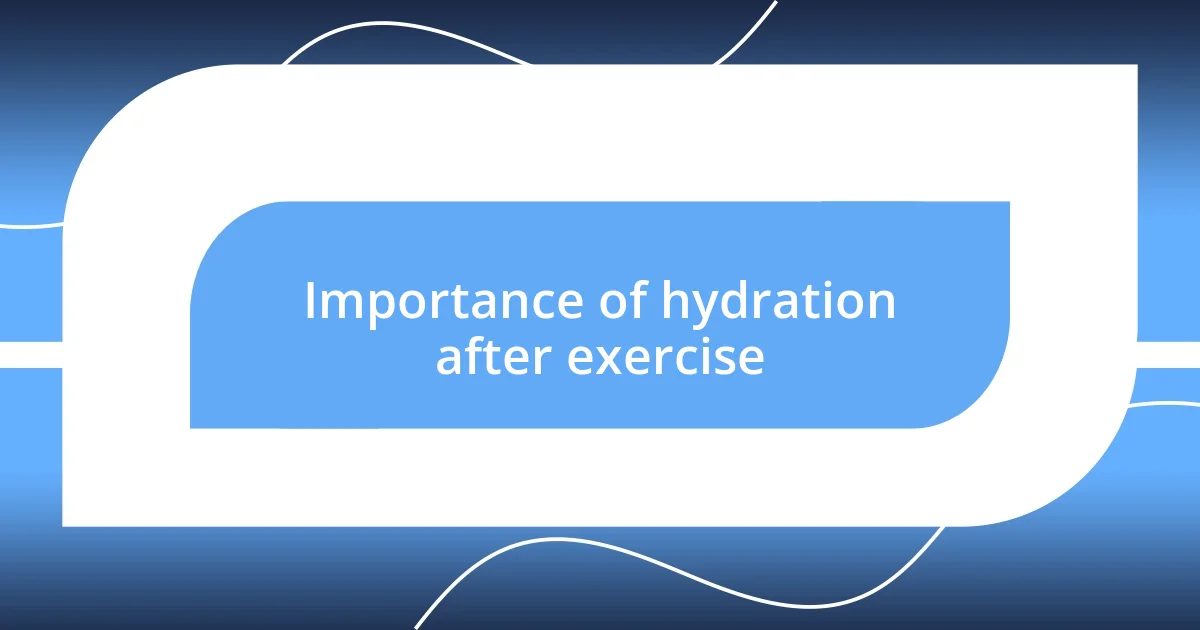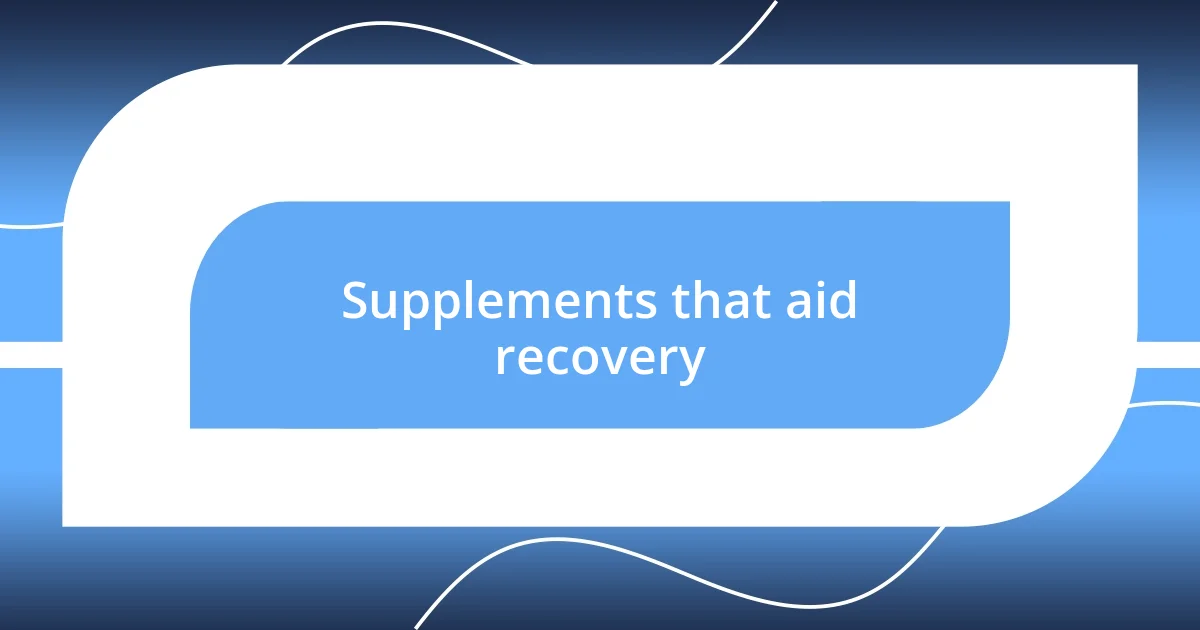Key takeaways:
- Post-workout recovery involves proper nutrition, including protein and carbohydrates, and staying hydrated to enhance muscle repair and overall performance.
- Incorporating effective stretching techniques and using aids like foam rollers can help alleviate tension and improve blood flow after workouts.
- Utilizing supplements such as BCAAs, creatine, and omega-3 fatty acids can significantly enhance recovery, reduce inflammation, and support muscle repair.

Understanding post-workout recovery
Understanding post-workout recovery goes beyond just resting; it’s about how your body heals and rebuilds itself after intense activity. I remember the first time I really focused on my recovery. I’d pushed hard in the gym, and the next day, I could barely move. It was a wake-up call that recovery is as essential as the workout itself.
When I think about recovery, I often wonder, “Am I giving my body what it truly needs?” After a tough session, the right mix of nutrients can make a significant difference. Personally, I’ve found that refueling with a good balance of protein and carbs not only eases soreness but actually helps me feel ready for my next workout. It’s fascinating how the body responds when you provide it with proper nourishment.
Beyond nutrition, hydration plays a crucial role in recovery, something I didn’t fully appreciate until I experienced dehydration after a workout. That feeling of fatigue and lightheadedness was a strong reminder to always drink enough water! Have you ever felt sluggish after exercising? That’s your body signaling for more fluids. It’s amazing how something as simple as staying hydrated can dramatically improve your recovery experience.

Importance of hydration after exercise
Hydration is more than just quenching thirst; it’s essential for helping your body recover. When I finish a workout, the first thing I reach for is water or a hydrating drink. I’ve learned the hard way that neglecting this can lead to muscle cramps and prolonged soreness. Just a few weeks ago, after an intense cycling session, I forgot to hydrate properly. The next day, every muscle felt stiff, and it took much longer to bounce back than it should have.
Moreover, staying hydrated can help regulate body temperature and keep your heart rate in check. I remember feeling unfocused during a workout because I hadn’t drunk enough water beforehand. It’s a little disappointing when you go hard only to realize dehydration is holding you back. This has made me realize that hydration is not just an afterthought; it’s a game changer in my overall wellness routine.
To put it simply, drinking water helps replenish lost fluids and supports nutrient transport throughout the body, which is vital for repair. I now make a point to drink water throughout the day and immediately after exercising. It’s a straightforward habit that has transformed how I feel and perform. I’ve even started tracking my water intake, and trust me—it makes a difference!
| Hydration Benefits | Effects of Dehydration |
|---|---|
| Supports muscle repair and recovery | Increases muscle soreness |
| Regulates body temperature | Can lead to overheating |
| Improves nutrient transport | Slows down recovery |
| Enhances overall performance | Decreases focus and energy |

Nutrients needed for muscle repair
To facilitate muscle repair after a workout, it’s crucial to consume specific nutrients that play significant roles in recovery. Personally, I’ve found that focusing on protein and carbohydrates right after exercise has made a world of difference in how quickly I bounce back. The protein aids in muscle recovery and growth, while carbs replenish glycogen stores, providing the energy my body craves. I’ve noticed that when I prioritize these nutrients, my soreness diminishes and my performance improves.
Here are the essential nutrients that support muscle repair:
- Protein: Essential for repairing and building new muscle fibers.
- Carbohydrates: Replenish glycogen stores to fuel recovery.
- Healthy Fats: Aid in reducing inflammation and support overall recovery.
- Electrolytes (sodium, potassium, magnesium): Help with hydration and muscle function.
- Vitamins (especially B vitamins and Vitamin C): Play key roles in energy metabolism and immune function.
Integrating these nutrients into my post-workout meals has become a non-negotiable part of my routine. I’ve experimented with different foods, and something simple like a banana with some peanut butter or a protein shake makes recovery feel like less of a chore and more of a treat. The right choices help me genuinely feel like I’m taking care of my body, which is a satisfying and motivating experience!

Effective stretching techniques for recovery
Stretching after a workout isn’t just a luxurious add-on; it’s a fundamental element to enhance recovery. I can’t tell you how many times I’ve felt that glorious release after a good stretch. Recently, after a tough strength training session, my muscles were tightening up, and I knew I needed to focus on some effective stretching to ease the tension. I started integrating dynamic stretches before workouts and static stretches during recovery, and it’s made a tremendous difference in how I feel afterward.
One technique that I swear by is the hamstring stretch. I simply sit on the floor, extend one leg, and slowly reach toward my toes. This move not only relieves that post-leg day tightness but also creates a beautiful sense of calm. I often close my eyes and breathe deeply while holding the stretch. Have you noticed how those moments can really help you reconnect with your body? It’s meditative and rewarding all at once, something I never used to appreciate as much until I truly focused on my recovery.
I’ve also become a fan of the foam roller as a stretch aid. The first time I rolled out my quads after a challenging run, I felt like I was rediscovering muscles I didn’t even know were tight! Foam rolling helps to release tension and improve blood flow, which speeds up recovery. Just the other day, I rolled out my back after an especially grueling cross-training session, and the relief was immediate. It’s like giving yourself a mini-massage! What stretching techniques resonate with you? I’d love to know what works wonders for you, as every body has its unique needs!

Supplements that aid recovery
After workouts, I often turn to specific supplements that have become a staple in my recovery routine. One that stands out for me is BCAAs or Branched-Chain Amino Acids. I remember the first time I tried them; my post-workout fatigue was significantly lower, and I could actually feel my muscles recovering more efficiently. They’ve been said to reduce muscle soreness and improve recovery time, which aligns perfectly with my goals to bounce back quickly and hit the gym again.
I’ve also been intrigued by creatine as a recovery aid. Initially, I was skeptical, thinking it was just for building muscle. However, after incorporating it into my regimen, I noticed an uptick in my overall energy levels and performance in subsequent workouts. Have you ever tried a supplement that completely changed your approach? For me, creatine was that eye-opener, helping me realize that recovery doesn’t just happen—it can be enhanced with the right tools.
Lastly, I can’t overlook the benefits of omega-3 fatty acids. They’re not just for heart health! I’ve added fish oil to my post-workout routine, and it’s been instrumental in reducing inflammation. I distinctly remember a week when I was doing particularly intense workouts. By taking omega-3s regularly, the joint pain I usually experienced was almost non-existent. It’s fascinating to think about how supplements can genuinely influence recovery—what’s been your experience with them? Finding the right combination can feel like unlocking a secret to faster recovery and better performance.

Creating a personalized recovery plan
Creating a personalized recovery plan requires a thoughtful approach that aligns with your individual needs and workout routine. I often reflect on my recovery strategies after an intense session. For example, I’ve discovered that alternating between yoga and rest days significantly enhances my overall recovery and mental clarity. What changes have you considered incorporating into your routine?
Another crucial aspect is to listen to your body. Recently, after a particularly grueling leg day, I made a point to jot down how my muscles felt over the following days. It became clear that when I prioritize rest, my performance improves the next time I hit the gym. This self-awareness helps me design a recovery plan specifically tailored to what my body craves.
Finally, mixing in recovery modalities like ice baths or gentle massages can also make a world of difference. I remember my first experience with an ice bath—it was shocking at first, but the relief in my muscles afterward was incredible. Have you ever tried something that challenged you but rewarded you in ways you hadn’t expected? Embracing these unique recovery techniques has truly made my post-workout routine feel more holistic and effective.














